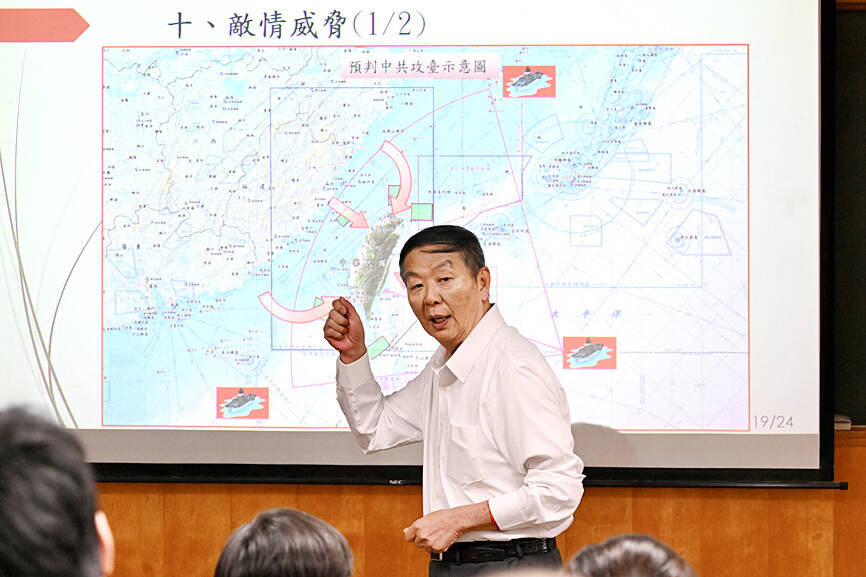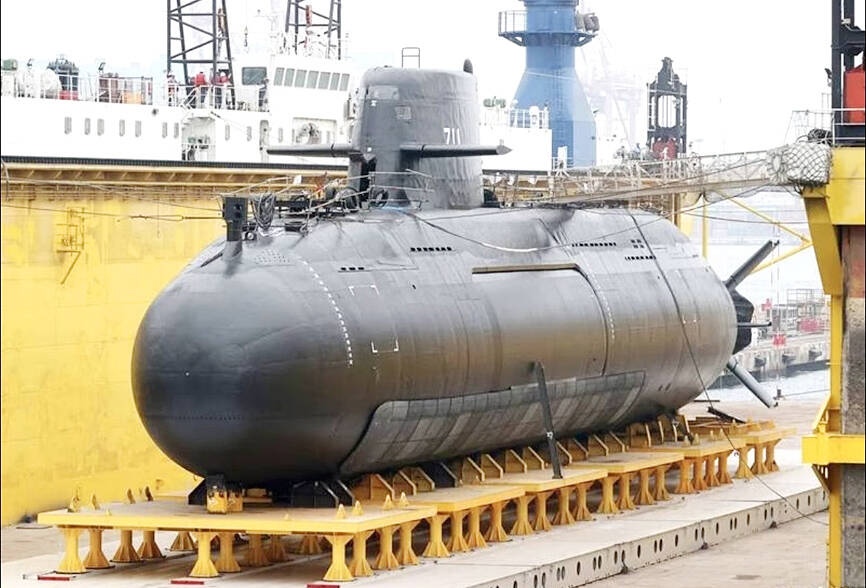Admiral Huang Shu-kuang’s (黃曙光) resignation as head of the Indigenous Submarine Program and as a member of the National Security Council could affect the production of submarines, a source said yesterday.
Huang in a statement last night said he had decided to resign due to national security concerns while expressing the hope that it would put a stop to political wrangling that only undermines the advancement of the nation’s defense capabilities.
Taiwan People’s Party Legislator Vivian Huang (黃珊珊) yesterday said that the admiral, her older brother, felt it was time for him to step down and that he had completed what he set out to do.

Photo: George Tsorng, Taipei Times
The resignation also coincides with the handing off of President Tsai Ing-wen’s (蔡英文) administration to the in-coming administration of president-elect William Lai (賴清德), Vivian Huang said.
Huang Shu-kuang recently filed defamation lawsuits against media personalities demanding NT$2 million (US$61,557) in damages over allegations of corruption during his time overseeing the submarine project.
Under the admiral’s watch, the nation’s first domestically made submarine, the Hai Kun (海鯤), or Narwhal, was launched in Kaohsiung in September last year. It is undergoing harbor acceptance tests.

Photo: Lee Hui-chou, Taipei Times
CSBC Corp, Taiwan (台船) chairman Cheng Wen-lon (鄭文隆) last month said that the nation’s first domestically built submarine would be ready for delivery by the deadline of Nov. 3 next year.
Huang Shu-kuang’s plan was to stagger the production of seven indigenous submarines over three phases: three in the first phase, including the Hai Kun prototype and two others, followed by a final batch with performance upgrades.
The source said that during an internal meeting, Lai asked that production funding for the submarines be provided in full in one budget.
However, with Huang Shu-kuang’s exit, the Ministry of National Defense and Navy Command Headquarters would take over the project, which would change production timelines, the source said.
Navy Commander Tang Hua (唐華) has other opinions regarding the construction of a naval force and improving combat readiness, such as the planned littoral combatant command, they said.
According to the navy, the command would control the Hai Feng Shore Based Anti-ship Missile Group, a unit of speedboats armed with anti-air and surface-to-surface missiles, and maritime surveillance. The command would oversee all defense-related affairs within 24 nautical miles (44.4km) of the coast.
Tang has also commented on submarine production, saying that their manufacture, equipment and functions, and strategic deployment should be based on the combat environment that Taiwan might face.
That could require new thinking on how submarines would be deployed, the source said.
Whether Tang’s opinions on the program would align with National Security Council Deputy Secretary-General Wellington Koo’s (顧立雄) vision or would receive the support of Lai, depends on the who is in the Cabinet after the presidential inauguration on May 20, the source said.
Additional reporting by Lee Wen-hsin

The Ministry of the Interior (MOI) is to tighten rules for candidates running for public office, requiring them to declare that they do not hold a Chinese household registration or passport, and that they possess no other foreign citizenship. The requirement was set out in a draft amendment to the Enforcement Rules of the Public Officials Election and Recall Act (公職人員選舉罷免法 ) released by the ministry on Thursday. Under the proposal, candidates would need to make the declaration when submitting their registration forms, which would be published in the official election bulletin. The move follows the removal of several elected officials who were

The Republic of China (ROC) is celebrating its 114th Double Ten National Day today, featuring military parades and a variety of performances and speeches in front of the Presidential Office in Taipei. The Taiwan Taiko Association opened the celebrations with a 100-drummer performance, including young percussionists. As per tradition, an air force Mirage 2000 fighter jet flew over the Presidential Office as a part of the performance. The Honor Guards of the ROC and its marching band also heralded in a military parade. Students from Taichung's Shin Min High School then followed with a colorful performance using floral imagery to represent Taiwan's alternate name

FOUR DESIGNATED AREAS: Notices were issued for live-fire exercises in waters south and northwest of Penghu, northeast of Keelung and west of Kaohsiung, they said The military is planning three major annual exercises across the army, navy and air force this month, with the navy’s “Hai Chiang” (海強, “Sea Strong”) drills running from today through Thursday, the Ministry of National Defense said yesterday. The Hai Chiang exercise, which is to take place in waters surrounding Taiwan, would feature P-3C Orion maritime patrol aircraft and S-70C anti-submarine helicopters, the ministry said, adding that the drills aim to bolster the nation’s offshore defensive capabilities. China has intensified military and psychological pressure against Taiwan, repeatedly sending warplanes and vessels into areas near the nation’s air defense identification zone and across

COVETED PRIZE: The US president would be a peace prize laureate should he persuade Xi Jinping to abandon military aggression against Taiwan, William Lai said US President Donald Trump should get the Nobel Peace Prize should he be able to convince Chinese President Xi Jinping (習近平) to abandon the use of force against Taiwan, President William Lai (賴清德) told a conservative US radio show and podcast in an interview. The US is Taiwan’s most important international backer, despite the absence of formal ties, but since Trump took office earlier this year he has not announced any new arms sales to the nation. Trump could meet Xi at the APEC summit in South Korea on Oct. 31 and Nov. 1. Lai, speaking on The Clay Travis and Buck Sexton